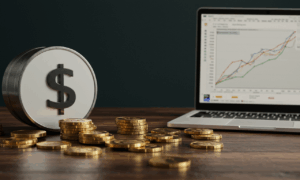ECONOMY
This week, the economic spotlight was firmly on inflation and the U.S. central bank’s response. The two main events provided a clearer, albeit cautious, picture of the path ahead for the American economy.
- Inflation Shows Encouraging Signs of Cooling: The latest Consumer Price Index (CPI) report, a crucial measure of inflation, came in softer than expected. Think of the CPI as a national shopping basket filled with everyday goods and services like gasoline, groceries, and rent. The report showed that the rate at which these prices are increasing has slowed down. This is welcome news for everyone, as it means the intense pressure on household budgets is beginning to ease. Slower inflation is a key ingredient for a stable and healthy economy.
- The Federal Reserve Holds Interest Rates Steady: In a highly anticipated decision, the U.S. central bank, often called the Fed, chose to keep its benchmark interest rate unchanged. This rate influences the cost of borrowing for everything from credit cards and car loans to mortgages. While keeping rates high helps fight inflation, the Fed also updated its future plans. Officials now project only one interest rate cut in 2024, down from a previous forecast of three. This indicates that while progress on inflation is good, the Fed remains cautious and wants more conclusive evidence before it begins to make borrowing cheaper.

FINANCE
In the world of corporate and international finance, trade tensions and technological ambitions drove the biggest headlines, impacting some of the world’s largest companies.
- Europe Raises Trade Barriers on Chinese Electric Vehicles: The European Union announced it will impose new, hefty tariffs on electric vehicles (EVs) imported from China. A tariff is a tax placed on an imported product, which makes it more expensive for consumers. The EU stated this move is to level the playing field, arguing that Chinese EV makers benefit from unfair government subsidies that allow them to sell their cars at lower prices. This decision could ignite a trade dispute, impacting the financial performance of global automakers and potentially raising EV prices for European buyers.
- Apple’s Big AI Announcement Boosts Its Value: Apple finally revealed its strategy for artificial intelligence, naming it Apple Intelligence. A major part of this initiative is the integration of OpenAI’s popular ChatGPT into its software for iPhones and other devices. The financial markets reacted with strong approval, sending Apple’s stock price to a new all-time high and briefly making it the world’s most valuable company once again. This strategic move is seen as vital for Apple’s long-term growth, positioning it to compete fiercely in the booming AI sector.
INVESTMENTS
Investors had a lot to digest this week, with economic data and corporate news fueling a strong rally in the stock market, particularly within the technology sector.
- Stock Market Indexes Soar to New Records: Buoyed by the positive inflation news, several key stock market indexes, including the S&P 500 and the Nasdaq Composite, surged to record highs. The S&P 500 is a broad index that tracks 500 of the largest U.S. companies and is often used as a barometer for the overall market’s health. Investors saw the cooling inflation as a signal that the economy is stabilizing, increasing the chances that the Fed will cut interest rates in the future, which is typically a major positive for stock valuations.
- The AI-Powered Tech Rally Forges Ahead: The investment narrative continues to be dominated by the transformative potential of artificial intelligence. The recent market highs were not broad-based but were instead led by a select group of mega-cap technology companies. Industry giants at the center of the AI revolution, such as chip designer Nvidia and a newly re-energized Apple, were the primary drivers of this week’s gains. This highlights a powerful trend where investors are concentrating their capital in companies they believe will be the biggest winners in the AI-driven future.
Frequently Asked Questions (FAQ)
Why does a cooler inflation report often cause the stock market to go up?
A cooler inflation report is good for the stock market for two main reasons. First, it reduces pressure on the Federal Reserve to keep interest rates high. The prospect of future rate cuts makes borrowing cheaper for companies, allowing them to invest in growth, which can lead to higher profits. Second, when interest rates are lower, safer investments like bonds become less attractive, pushing investors toward stocks in search of better returns. The market reacts quickly to this positive outlook.
What does the Federal Reserve’s interest rate decision mean for my personal finances?
The Fed’s decision directly impacts your wallet. When rates are held high, you’ll likely see continued high interest rates on credit card debt and personal loans, making it more expensive to borrow. For savers, it’s good news, as high-yield savings accounts will continue to offer attractive returns. For mortgages, those with variable rates will not see relief, and while fixed mortgage rates have come down slightly, they will likely remain elevated until the Fed signals a definitive move to cut its benchmark rate.



